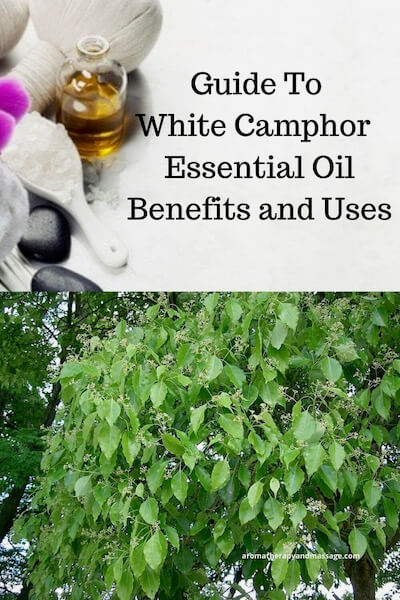- Home
- Essential Oil Profiles
- Camphor Essential Oil
As an affiliate for Bookshop, Amazon, and other programs, I may earn a small commission for products purchased through links. This doesn't affect the price you pay. Privacy policy and disclosures.
Search this site:
Guide to White Camphor Essential Oil Benefits and Uses
White camphor essential oil (Cinnamomum camphora) is a fragrance of warrior angels, states aromatherapist Valerie Ann Worwood in Aromatherapy For the Soul. She writes, "With the might of the angelic realms and the heavens behind it, camphor brings cleansing and purification." She goes on to say that emotionally the oil is uplifting, stimulating, and liberating.

Camphor is not only the name of an essential oil but also the name of a chemical component found in a number of essential oils. However, white camphor oil contains only a small amount of the constituent camphor.
Confusion also arises because the Cinnamomum camphora tree has three chemotypes that provide different essential oils:
- Hon-sho (camphor chemotype) produces camphor oil.
- Ho-sho (linalool chemotype) produces ho wood oil, ho leaf oil, and shiu oil.
- Yu-sho (cineole chemotype) produces ravintsara oil.
Sources: Robert Tisserand and The Complete Guide to Aromatherapy, Third Edition, Vol. 1
Basic Camphor Facts
Plant family: Lauraceae
Production: A crude camphor oil is steam distilled from the wood, root stumps, and branches of the tree. The crude oil is then rectified (repeatedly distilled) and fractionated (divided) into four oils: white, yellow, brown, and blue. Only white camphor is safe for aromatherapy.
Aroma: Fresh, intense, woody.
Perfume/Aromatic note: Base to Middle.
Is white camphor safe to use during pregnancy? No.
Is white camphor essential oil safe for children? Some sources recommend not using the oil with children under age 10.
Cautions: If the oil becomes oxidized, it may cause skin sensitization
Main components:
- (+)-limonene 44.2%
- p-cymene 24.2%
- alpha-pinene 8.9%
- 1,8-cineole 6.5%
- camphor 2.4%
Source: Essential Oil Safety, 2nd Edition
White Camphor Aromatherapy Benefits
The Complete Book of Essential Oils and Aromatherapy: White camphor may help relieve muscle injuries, aches, and pains; rheumatism; and colds and sinus problems. The oil also acts as an insect repellent.
375 Essential Oils and Hydrosols: Camphor essential oil is a tonic and general stimulant. Its two primary uses are in a massage oil blend and for inhalation to support the respiratory system.
The Encyclopedia of Essential Oils (updated edition): Use white camphor in skin care to reduce acne, oily skin, and spots and to repel insects. Also use the oil to relieve conditions of the muscles and joints, such as aches and pain, arthritis, strains, and sprains. This essential oil also supports the respiratory system.
Therapeutic Blending With Essential Oil: Use white camphor in detergents, soaps, other cleaning products, and moth and insect repellents. The oil is clarifying, energizing, and purifying. This essential oil may also help relieve arthritis pain, muscle aches and pains, coughs, and colds.
The Complete Guide to Aromatherapy, Third Edition, Vol. 1:
- To help relieve arthritis and muscle aches and pains, consider blending white camphor with essential oils such as black pepper, eucalyptus, fir, ginger, kunzea, spike lavender, peppermint, pine, rosemary, or tea tree.
- To help relieve cold and flu symptoms and congestion, consider blending camphor with oils such as cajeput, atlas cedarwood, eucalyptus, peppermint, pine, rosemary, tea tree, or thyme.
- The rasa (taste) of camphor is pungent and sour, the vipaka (aftertaste) is pungent, and the virya (energy) is heating and moisturizing.
- The oil decreases vata and kapha and increases pitta (in excess).
- Tissues most affected by the oil are plasma, blood, fat, marrow, and nerve. Affinity to the respiratory and nervous systems.
- Indications for this essential oil include lung and nasal congestion, sinus headaches, delirium, insomnia, painful periods, gout, and rheumatism.
Marma Points of Ayurveda adds that the oil calms the nervous system and is said to unfold divine love in your consciousness and compassion in your heart and also enhance devotion when applied to marma points associated with the heart.
Mixing Essential Oils for Magic: Camphor clears away negative energy, especially in the home. The oil enhances psychic power, divination, and dreamwork. Other effects of this essential oil include subduing sexual desire, keeping the mind focused, and bringing emotional clarity when you are seeking growth or healing.
White Camphor Essential Oil Uses and Blends
Blends to help relieve coughs, colds, or flu:
- When you feel like you're coming down with a cold, diffuse 1 drop white camphor, 2 drops clove, and 4 drops lemon in an aromatherapy diffuser.
- For an aromatherapy inhaler to use during the day, use 1 drop white camphor and 1 drop eucalyptus.
- Use camphor in decongestant balms and cold rubs.
For respiratory congestion, use a steam inhalation by adding the following essential oils to a bowl of steaming water:
- 1 drop white camphor
- 2 drops lavender
- 3 drops eucalyptus
With a towel over your head, close your eyes, lean over the bowl, and inhale the steam for 5 to 10 minutes.
To help relieve winter depression or seasonal affective disorder (SAD) diffuse this blend of essential oils:
- 2 drops bergamot
- 2 drops geranium
- 2 drops white camphor
Pain-Relief Bath
To help relieve aches and pains, mix 2 drops each of white camphor, lavender, and rosemary essential oils with 1 tablespoon bath oil. Stir the blend into a warm bath.
Source: Base Formula
Circulation-Promoting Massage Oil
- 8 drops camphor essential oil
- 8 drops grapefruit essential oil
- 4 drops cumin essential oil
- 2 tablespoons tamanu carrier oil
Source: New Directions Aromatics
Pain-Relief Body Lotion
Use this lotion to help relieve the pain of arthritis, rheumatism, muscles aches and pains, sciatica, and sprains.
- 5.5 tablespoons unscented lotion or cream
- 2.5 teaspoons aloe vera gel
- 1 teaspoon arnica carrier oil
- 20 drops white camphor essential oil
- 20 drops sweet marjoram essential oil
- 20 drops roman chamomile essential oil
- 20 drops plai essential oil
Blend the ingredients in a 8-ounce glass jar with cap. Use as needed.
Adapted from Penny Price Aromatherapy
Buy essential oils: Aromatics International or Rocky Mountain Essential Oils.
Photo Credit: KENPEI, CC BY-SA 3.0, via Wikimedia Commons



